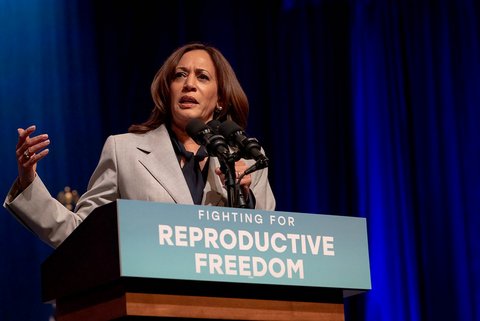
14 Oct Harris’ Healthcare Stance Highlights Abortion, Economy

Reproductive rights are a key issue for Democratic presidential nominee Kamala Harris, who has also framed healthcare as an economic issue. Here, Vice President Harris is speaking at a Washington, D.C., reproductive freedom event on April 26, 2023. (Photo by The Democratic Party on Flickr / CC BY-NC 2.0 license)
By America Leon
In this tumultuous presidential campaign cycle, divisive issues like the economy and immigration have taken center stage, while other issues have, unfortunately, gotten lost in the noise. Aside from abortion, broader healthcare policy positions have seldom been addressed by either candidate.
With Vice President Kamala Harris’ presidential campaign less than three months old and the former President Donald Trump only saying he has “concepts of a plan” at their Sept. 10 debate, many Americans are left wondering how healthcare policy might fare in the coming four years.
A Sept. 18 webinar by the USC Center for Health Journalism offered some answers, focusing on Harris’s campaign and the potential impacts of a Harris presidency on American healthcare policy.
Megan Messerly, politics reporter for Politico, pointed out that a consequence of Harris’s young campaign is that she has not had as much time to explain the more intricate nuances of her policy positions. However, she has firmly framed healthcare as an economic issue, emphasizing the importance of affordable healthcare.
Harris has strategically spoken to the economic issues voters are enduring by reiterating the Biden-Harris administration’s successful $35 cap on insulin through Medicare, said Messerly. This strategy is due, in part, to the fact that the economy is a prominent concern for most Americans.
A critical part of Harris’s economically conscious healthcare plan is providing Americans with medical debt relief. Rachel Cohrs Zhang, chief Washington correspondent for STAT, pointed out that Harris’s exact approach is to be determined, but it will likely emulate existing models we have seen in some states.
North Carolina, for example, has structured an innovative medical debt relief program to pay hospitals back for debt using federal Medicaid dollars and “implement some guard rails” for medical debt prevention, said Cohrs Zhang. Other states have used unspent COVID-19 relief dollars to relieve older debt from primarily low-income patients. However, there are some concerns about whether these plans can be executed nationally.
Cohrs Zhang acknowledges that, as we have seen with the Affordable Care Act and Medicaid expansion, political division may deter some state legislators from participating in particular voluntary programs; this could be dire. Patients in states that elect not to participate in such programs will remain burdened with their debt, effectively heightening existing inequities.
One of the foremost issues that Harris has focused on during her campaign is abortion, but there are still some uncertainties regarding her more specific reproductive healthcare policy positions.
Though Harris has expressed her intent to sign legislation restoring the protections of Roe v. Wade, she has not clarified her position on its restrictions. Roe v. Wade permitted states to restrict abortion in the third trimester of pregnancy “so long as they had exceptions, if necessary, to save the life of the mother,” said Messerly, which Harris has yet to weigh in on.
While there are growing concerns regarding “the FDA’s approval of mifepristone if Donald Trump becomes president again,” a Harris administration would ensure the accessibility of the emergency contraceptive drug, said Messerly.
The Biden administration has spoken about enforcing the Emergency Medical Treatment and Labor Act, a federal law requiring hospitals “to provide emergency care to patients as a condition of receiving Medicare funds” to demand that hospitals “provide care to women who are miscarrying” or “women who have taken abortion pills,” according to Messerly.
Abortion rights activists hope to see a Harris administration be more proactive about using the act to encourage hospitals to make different decisions when it comes to providing emergency reproductive care in states with abortion bans.
We can already see, though, that Harris is approaching abortion rights and reproductive healthcare differently than previous presidents. She was the first vice president to visit an abortion clinic and is notably “very comfortable talking about abortion in a way that President Biden never was,” said Messerly.
Another pressing healthcare policy issue that has not been discussed along the campaign trail is the expiration of federal Affordable Care Act subsidies. This program, created by Democrats, has made “insurance plans on Affordable Care Act exchanges cheaper” and “led to […] record enrollment,” but will “expire at the end of 2025,” said Cohrs Zhang.
Americans relying on these subsidies to afford their premiums may lose insurance if the program is not extended.
Harris has said she plans to “build and strengthen the Affordable Care Act,” which would likely encompass “extending [Affordable Care Act] subsidies,” said Messerly. Republicans will presumably be more hesitant.
However, a critical consideration Republican lawmakers will have to make about the possible extension of these programs is the benefit they have had on their constituents.
“Though these subsidies passed without Republican support initially, they actually benefit states that have not expanded Medicaid more than they benefit … states that have,” Cohrs Zhang said.
While the future of this policy will be impactful for many Americans, the unfortunate reality is that voters might be unaware of the intricate details and direct effects they will have on them.
Regarding the future of Medicaid under a Harris administration compared with Trump, Messerly said that there has also been little to no discussion of the program during this campaign cycle.
Both former President Trump and Vice President Harris have said they will not “cut Social Security or Medicare,” but budgetary constraints signal that something must change in the next four years, said Messerly.
Republicans have toyed with the possibility of implementing work requirements “as a condition of receiving Medicare or Medicaid,” she said. Harris, on the other hand, “would likely be very supportive of states trying to expand Medicaid,” building upon the Biden administration’s pursuit for “state-specific solution[s]” in the 10 states that have held out from expanding Medicaid.
Although not specific to healthcare policy, Messerly also acknowledged the bipartisan interest in expanding the Child Tax Credit. Both candidates have outlined a different approach to doing so. Still, the fact that both sides have some agreement on this issue shows how important the economy and household budgets are to many Americans.
>>From Our Archives:
The Expanded Child Tax Credit Gave Poor Families a Boost, But It Didn’t Last<<<
The upcoming election will undoubtedly be consequential for healthcare access and affordability; therefore, understanding what is at stake and how each policy may affect you, especially concerning lesser-discussed and nuanced issues, is imperative.






No Comments